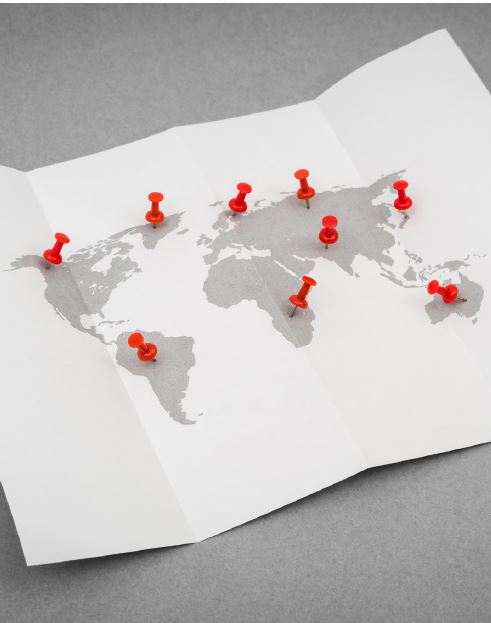Un nouvel ordre mondial?

Nul doute que l’attaque russe contre l’Ukraine marque un tournant dans l’Histoire et la stabilité de l’ordre européen : plus de 250 000 morts des deux côtés, la destruction barbare de villes entières, des crimes de guerre, des Européens déboussolés mais unis dans leur soutien à l’Ukraine, le réarmement spectaculaire de l’Allemagne et de l’UE, la mise au ban de la Russie, l’extension de l’Otan et l’implication massive des États-Unis aux côtés de Kiev, tout cela représente une véritable révolution stratégique, pour l’UE et pour les États-membres. Mais en est-il de même pour l’ordre mondial ? La guerre en Ukraine marque-t-elle aussi une rupture radicale pour le reste de la planète ? S’agit-il au contraire d’un évènement certes spectaculaire mais dont les effets se limiteront au continent européen ?
Dans le camp des relativistes, qui tempèrent les implications stratégiques de cette guerre et y voient avant tout un évènement européen, plusieurs arguments sont dignes d’intérêt. Tout d’abord, ce n’est pas la guerre en Ukraine qui a créé la rivalité entre les États-Unis et la Chine : celle-ci se renforce depuis plus d’une décennie, elle est devenue un élément structurant de l’ordre mondial. Si la guerre en Ukraine renforce cette bipolarité, elle n’en est en aucune manière l’initiatrice. De même, la division des pays du Sud entre partisans de l’un ou l’autre camp – l’Ouest ou la Russie – est vieille comme la guerre froide : chacune des superpuissances de l’époque se faisait la guerre dans le Tiers-Monde, en Afrique, en Asie, comme en Amérique latine, par satellites interposés, tandis que nombre d’autres pays tentaient de rester dans la voie plus sereine du non-alignement. Quant à l’Onu et au multilatéralisme, notamment en matière de sécu- rité, cela fait des années qu’ils sont paralysés, Américains, Russes ou Chinois utilisant régulièrement leur veto chaque fois qu’une résolution leur déplait. Enfin, s’agissant de la mondialisation économique, la Terre continue de tourner, avec une intégration soutenue des marchés financiers, une explosion des communications et l’irruption de révolutions technologiques phénoménales. Les sanctions occidentales contre la Russie ne signent pas la fin de la mondialisation : tout au plus ont-elles pour effet de redistribuer les flux du commerce mondial, avec un axe russo-chinois plus conséquent qu’auparavant et des vulnérabilités plus grandes de certains pays du Sud, notamment sur les plans alimen- taire et énergétique.
Du côté des révolutionnaires, au sens de ceux qui font de la guerre en Ukraine l’acte de naissance d’un nouveau système stratégique mondial, d’autres arguments sont aussi recevables. Le plus crucial concerne la Chine. De multiples façons, la guerre en Ukraine transforme en effet ce pays en puissance européenne : les rumeurs sur les possibles médiations chinoises vont bon train, Pékin a même proposé un plan de paix en février, ses interventions pour calmer les gesticulations nucléaires de Vladimir Poutine sont vues avec soulagement par les Occidentaux. Même si « l’amitié éternelle » affichée entre Pékin et Moscou ne laisse aucune ambiguïté sur la position de la Chine, celle-ci a gagné son statut de puissance incontournable pour le règlement d’un conflit en Europe, et c’est une grande première.
Autre évolution notable : l’idéologie revient en première ligne comme structuration stratégique du monde. Les États-Unis ont en effet enfourché le discours d’une troi- sième guerre mondiale entre démocraties et autoritarismes, d’une nouvelle guerre froide entre « l’Ouest et le reste », discours que Russes et Chinois adorent également s’approprier sans que l’on sache vraiment qui de la poule ou de l’œuf est premier dans cette histoire. Rarement depuis la fin de la guerre froide – où la lutte entre démocratie et totalitarisme servait de fondement à la bipolarité nucléaire du monde – on avait vu une telle radicalité idéologique de part de d’autre, radicalité qui pourrait même impacter les relations commerciales entre les USA et la Chine.
Enfin, c’est au Sud que se situe la troisième nouveauté. Ces pays du Sud, autrement dit plus de la moitié de la population mondiale, s’émancipent de tout ordre mondial et font ce qu’ils veulent : ni inféodés, ni alliés, ni neutres, ni ennemis, ils peuvent être tout cela à la fois ou séparément, avec ou contre l’Occident. Leur pragmatisme, ou leur cynisme, renforce d’ailleurs encore plus la dérive radicale des idéologues des deux camps. Dans ce contexte, vouloir gagner la bataille de l’influence dans le Grand Sud (Global South), comme tentent de le faire les Occidentaux, ne prouve-t-il pas davantage notre désarroi que notre pertinence stratégique ?
De ces deux visions contraires, où se trouve la vérité du monde ? Donnons le mot de la fin à Pascal : « Plaisante justice qu’une rivière borne. Vérité en deçà des Pyrénées, erreur au-delà ».




